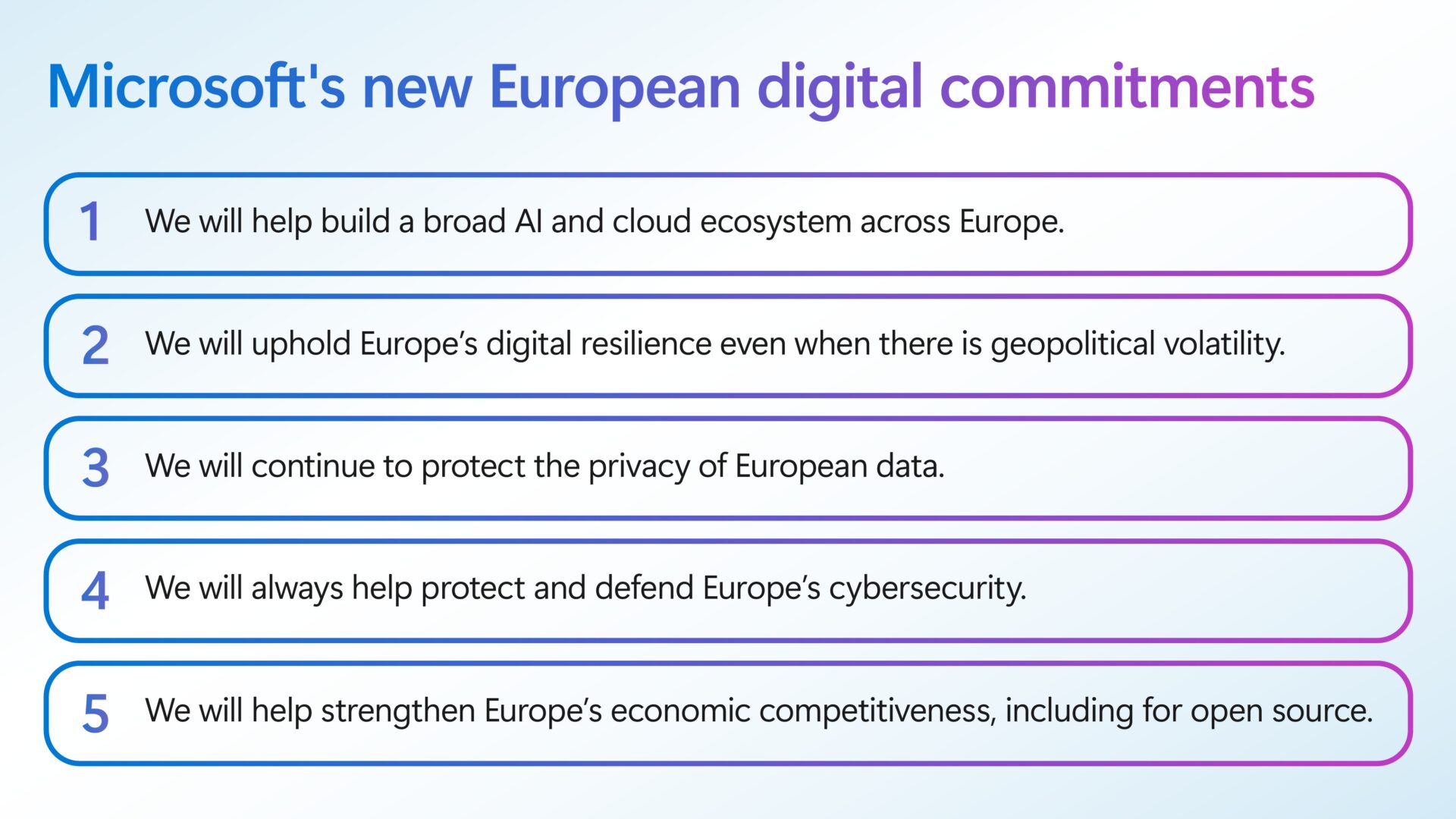Microsoft has announced major expansion plans across Europe. These include plans to augment cloud infrastructure and step up data center operations across 16 countries. It has also announced sovereign cloud initiatives and committed to abide by data protection and privacy laws of countries belonging to the European Union (EU) when it comes to the data of EU citizens.
In a recent blog on the Microsoft website, Brad Smith, Vice Chair & President, wrote, “Today, we are announcing plans to increase our European datacenter capacity by 40 percent over the next two years. We are expanding datacenter operations in 16 European countries. When combined with our recent construction, the plans we’re announcing today will more than double our European datacenter capacity between 2023 and 2027. It will result in cloud operations in more than 200 datacenters across the continent.”
This is significant given how the company had recently indicated that it may “strategically pace or adjust” its infrastructure in some areas. The company had said this in response to a report by TD Cowen, an American investment bank, that claimed that the global technology giant had cancelled data center leases. It is also noteworthy that Microsoft is continuing with its ambitious plans in the United Arab Emirates (UAE) and Kuwait in the Middle East and South Africa.
Addressing concerns surrounding data sovereignty and protection
He also shed light on sovereign cloud initiatives in France and Germany. “In France, Microsoft has partnered with Capgemini and Orange, who formed a joint venture named Bleu. Designed as a “cloud de confiance” (trusted cloud) platform, Bleu offers a broad range of Microsoft Azure cloud services and Microsoft 365 productivity tools operated under French control. In Germany, a similar sovereign cloud initiative is underway through a partnership between Microsoft, SAP, and Arvato Systems (a Bertelsmann IT subsidiary). This effort, through SAP’s subsidiary, Delos Cloud GmbH, is creating a sovereign cloud platform for the German public sector, hosted in German datacenters and operated by German personnel.”
This is significant given EU’s stringent laws pertaining to data protection, sovereignty and privacy. In fact, Microsoft has made an unequivocal commitment to these concerns by promising to adhere to local laws. “Like every citizen and company, we don’t always agree with every policy of every government. But even when we’ve lost cases in European courts, Microsoft has long respected and complied with European laws,” wrote Smith. Readers would recall that EU had started raising concerns about Microsoft’s allegedly anti-competition practices as early as the late 90s, and even fined the company in 2004. More recently, in June 2024, the European Commission had issued a Statement of Objections over possibly abusive typing practices regarding Teams.
Looks like Microsoft is now more open to complying with local laws. Smith wrote, “We understand that European laws apply to our business practices in Europe, just as local laws apply to local practices in the United States and similar laws apply elsewhere in the world. This includes European competition law and the Digital Markets Act, among others. We’re committed not only to building digital infrastructure for Europe, but to respecting the role that laws across Europe play in regulating our products and services.”
Microsoft is also preparing to comply with the requirements of laws such as Digital Operational Resilience Act (DORA), the NIS 2 Directive, and the Cyber Resilience Act (CRA), and has announced that it will appoint a Deputy Chief Information Security Officer (CISO) for Europe to oversee the company’s security responsibilities across Europe.
Navigating geo-political turbulence
“In a time of geopolitical volatility, we are committed to providing digital stability,” wrote Smith as he briefly touched upon the recent global economic turbulence caused by US President Donald Trump’s sudden announcement of tariffs and the subsequent volte face. “As a multinational company, we believe in trans-Atlantic ties that promote mutual economic growth and prosperity. We were pleased the Trump administration and the European Union recently agreed to suspend further tariff escalation while they seek to negotiate a reciprocal trade agreement. We hope that successful talks can resolve tariff issues and reduce non-tariff barriers, consistent with the recommendations in the recent Draghi report,” he wrote, adding, “We will always strive to be a voice of reason that promotes mutual opportunities and stable ties across the Atlantic. We in fact believe that even amidst current trade and tariff disputes, there is a strong consensus in Washington supporting the sustained flow of digital services from the United States to Europe.”



